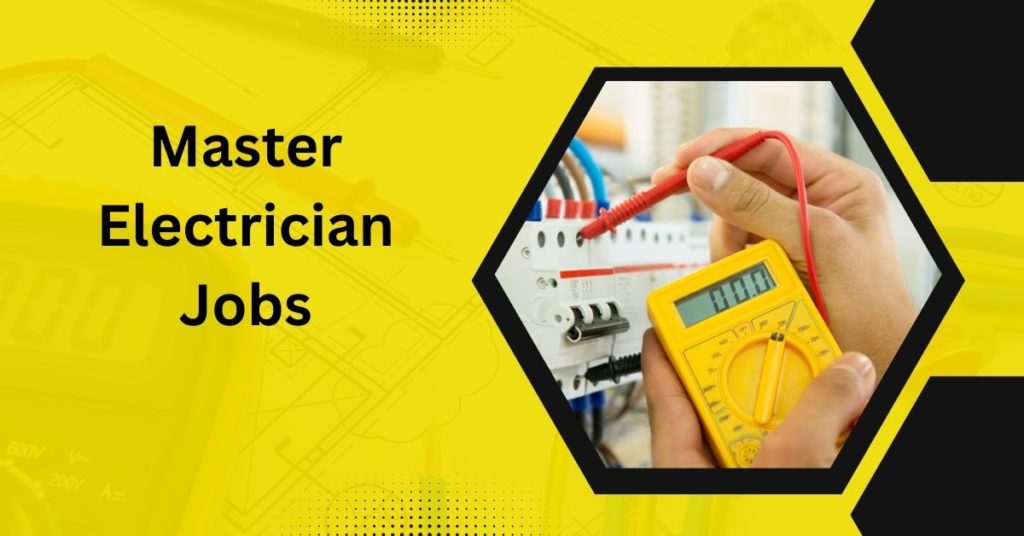Are you looking for a rewarding career that not only pays well but also gives you the opportunity to work on challenging and interesting projects? If so, master electrician jobs might be the perfect path for you. In this blog post, we’ll discuss what it takes to become a master electrician, the benefits of pursuing this career, job opportunities, and frequently asked questions to help you navigate this electrifying profession.

What is a Master Electrician?
Table of Contents
A master electrician is the highest level of electrician. They have extensive training and experience, and they are qualified to work on complex electrical projects. This includes anything from troubleshooting electrical systems in homes to working on large commercial projects. Master electricians can also take on supervisory roles, manage a team of electricians, and even run their own electrical contracting businesses.
Why Choose Master Electrician Jobs?
If you’re considering master electrician jobs, you’re probably wondering what makes this career path worth it. Here are some reasons why becoming a master electrician can be a great choice:
- High Demand: Electricians are always in demand, and as a master electrician, you can enjoy even more job opportunities and job security.
- Lucrative Salary: Master electricians earn significantly more compared to journeyman electricians. This increased earning potential makes the long journey worth it.
- Career Growth: Becoming a master electrician opens doors to supervisory roles, business ownership, and specialization in certain industries.
- Varied Work Environment: Master electricians get to work on a wide range of projects, from residential to commercial and even industrial settings.
Steps to Become a Master Electrician
To land those well-paying master electrician jobs, you need to follow a structured path. Here’s how you can achieve that:
- Complete Your Education: Start with a high school diploma or equivalent. Taking courses in algebra, physics, and electronics can give you a good foundation.
- Enroll in an Apprenticeship Program: The next step is to join an electrician apprenticeship program, which combines classroom learning with hands-on experience. These programs usually last about four years.
- Gain Work Experience as a Journeyman: After completing your apprenticeship, you’ll need to work as a journeyman electrician for a few years. This experience is crucial to developing the skills and knowledge needed to become a master electrician.
- Take the Master Electrician Exam: To become a master electrician, you’ll need to pass an exam that tests your knowledge of electrical codes, systems, and safety practices.
Job Opportunities for Master Electricians
Master electrician jobs offer a wide range of opportunities, from working in residential settings to taking on large-scale commercial projects. Some of the common career paths include:
- Residential Master Electrician: Handling electrical work in homes, such as installing wiring, troubleshooting electrical issues, and ensuring homes meet safety codes.
- Commercial Master Electrician: Working on electrical systems in commercial buildings, such as offices, retail spaces, and restaurants. This can involve managing a team of electricians on large projects.
- Industrial Master Electrician: These electricians work in industrial facilities, ensuring machinery and equipment operate efficiently and safely.
- Electrical Contractor: Many master electricians choose to start their own businesses, offering electrical services to residential, commercial, and industrial clients.
Salary and Benefits
When it comes to master electrician jobs, the salary is one of the most appealing aspects. On average, master electricians earn between $60,000 and $90,000 per year, with the potential for even higher earnings depending on location, experience, and industry.
Master electricians also enjoy benefits like health insurance, retirement plans, and paid vacation. If you choose to start your own business, the earning potential can be even greater, especially if you build a strong reputation in your community.
Skills Needed for Master Electrician Jobs
To excel in master electrician jobs, you need a combination of technical and soft skills:
- Technical Knowledge: A deep understanding of electrical systems, codes, and safety standards is essential.
- Problem-Solving Skills: Master electricians often troubleshoot complex electrical problems, requiring strong problem-solving abilities.
- Attention to Detail: Electrical work can be dangerous if not done correctly, so attention to detail is crucial.
- Leadership Skills: As a master electrician, you may be required to manage a team of electricians. Leadership skills can help you guide your team effectively.
- Customer Service: Whether you’re working for a company or running your own business, strong customer service skills will help you build relationships with clients.
Challenges in Master Electrician Jobs
Every career has its challenges, and master electrician jobs are no different. Some of the common challenges include:
- Physical Demands: Electricians often have to work in tight spaces, climb ladders, and lift heavy equipment. Good physical fitness is essential.
- Long Hours: Depending on the project, you may need to work long or irregular hours, especially when deadlines are tight.
- Safety Risks: Working with electricity can be dangerous, which is why it’s crucial to follow safety protocols and keep up with the latest safety standards.
How to Find Master Electrician Jobs
Finding master electrician jobs can be easier if you know where to look. Here are some options to consider:
- Online Job Boards: Websites like Indeed, Glassdoor, and LinkedIn frequently list job openings for master electricians.
- Local Trade Unions: Trade unions often have job listings and can help connect you with potential employers.
- Networking: Building relationships with other electricians, contractors, and industry professionals can help you find job opportunities.
- Starting Your Own Business: If you have an entrepreneurial spirit, consider starting your own electrical contracting business. This can be a great way to create your own job opportunities.
Frequently Asked Questions About Master Electrician Jobs
1. What is the difference between a journeyman and a master electrician?
A journeyman electrician is someone who has completed an apprenticeship and can work independently. A master electrician, on the other hand, has more experience, has passed a master electrician exam, and can take on more complex projects and supervisory roles.
2. How long does it take to become a master electrician?
It typically takes around 7-10 years to become a master electrician. This includes completing an apprenticeship, gaining experience as a journeyman, and passing the master electrician exam.
3. Are master electricians in demand?
Yes, master electrician jobs are in high demand. As the construction industry grows and older electricians retire, there is a constant need for skilled electricians to fill the gap.
4. Can master electricians start their own business?
Absolutely! Many master electricians choose to start their own electrical contracting businesses. This can be a great way to increase your earning potential and have more control over your work.
5. What skills do I need to become a successful master electrician?
In addition to technical skills, you need problem-solving abilities, leadership skills, attention to detail, and good customer service skills to succeed in master electrician jobs.
Conclusion
Master electrician jobs offer an excellent career path with high earning potential, job security, and opportunities for growth. Whether you want to work on residential, commercial, or industrial projects, or even start your own business, becoming a master electrician can open many doors. The journey requires dedication, but the rewards are well worth it. Start your journey today and light up your career as a master electrician!



